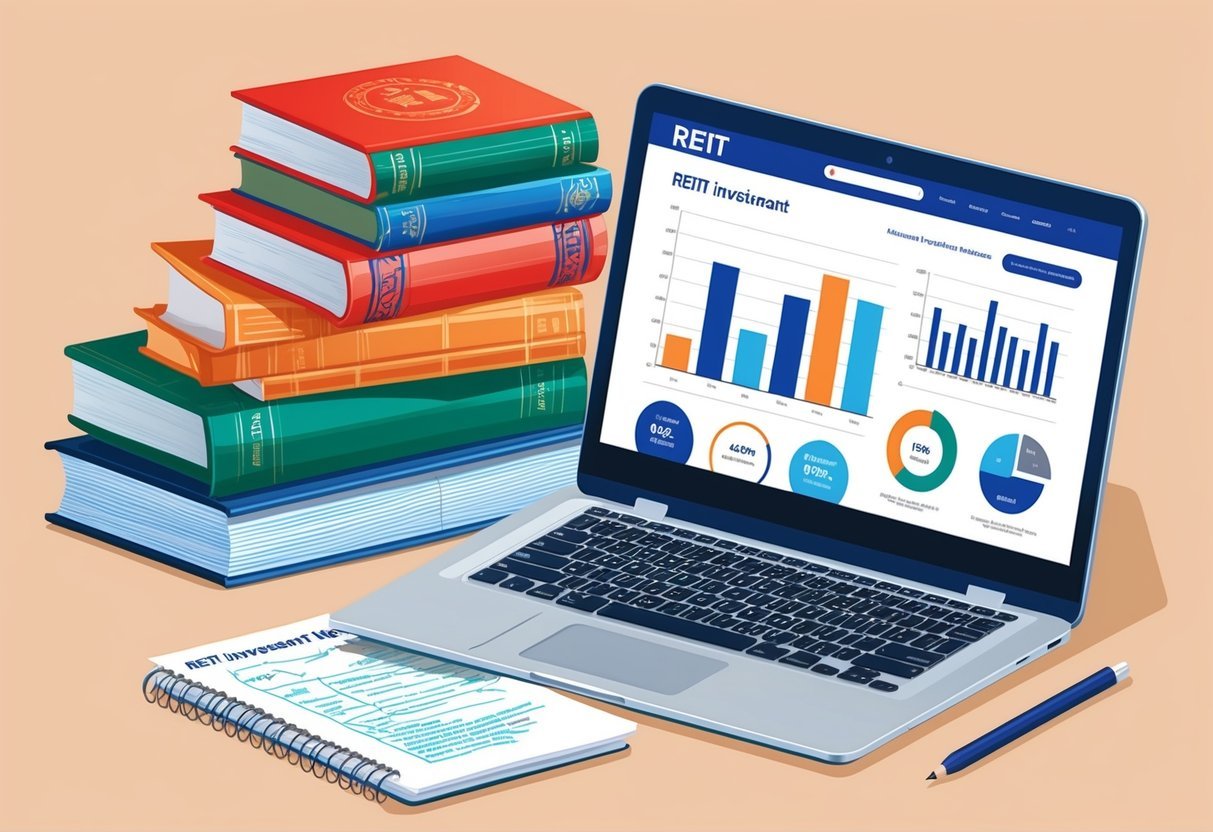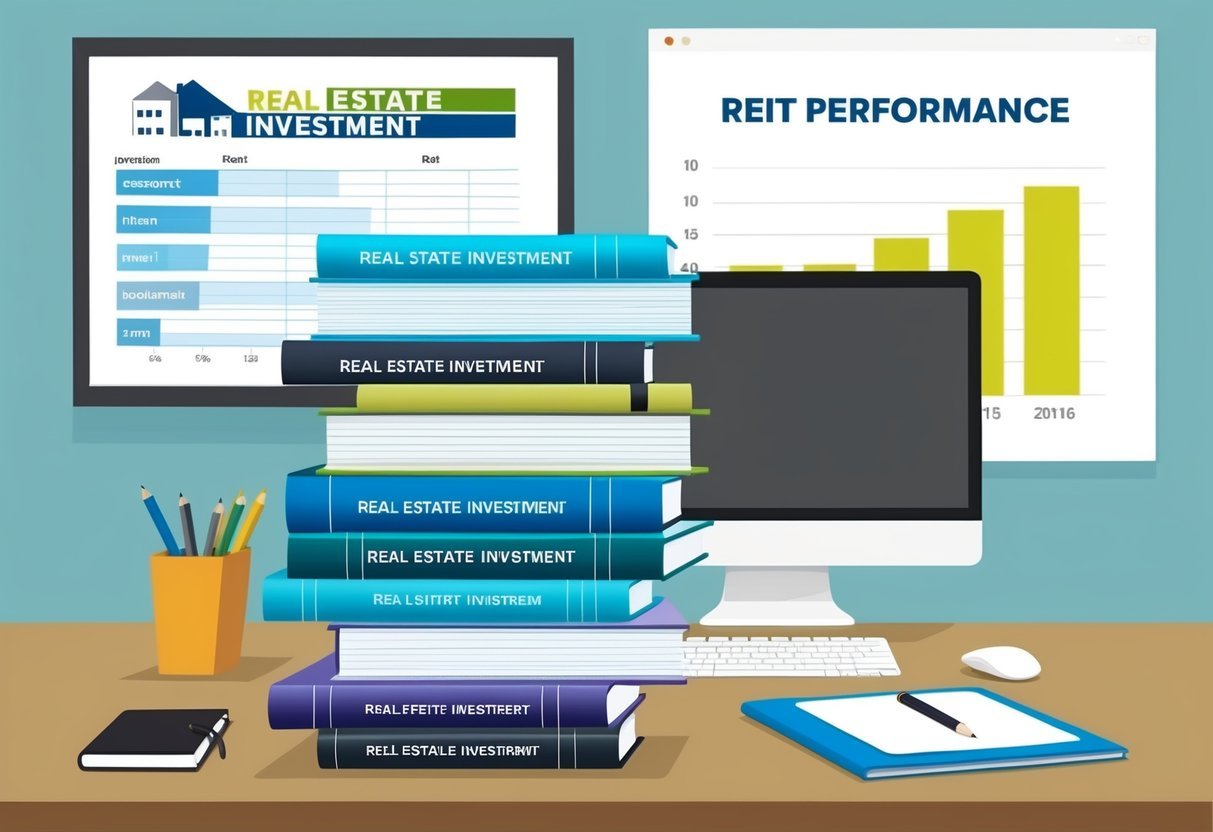Real Estate Investment Trusts (REITs) offer an attractive avenue for diversifying your investment portfolio.
These unique financial instruments allow you to participate in the real estate market without directly owning or managing properties.
By investing in REITs, you can potentially benefit from regular income streams and long-term capital appreciation.

Learning how to invest in REITs can significantly enhance your investment strategy and financial prospects. Whether you’re a seasoned investor looking to expand your horizons or a newcomer seeking to explore real estate opportunities, understanding the basics of REIT investing is crucial.
This article will guide you through five valuable resources that can help you navigate the world of REITs and make informed investment decisions.
1) Book: ‘The Intelligent REIT Investor’ by Brad Thomas

If you’re looking to expand your knowledge on Real Estate Investment Trusts (REITs), The Intelligent REIT Investor is an excellent resource.
This book, co-authored by Brad Thomas and Stephanie Krewson-Kelly, provides a comprehensive guide to building wealth through REIT investments.
You’ll find valuable insights into the REIT industry, including its history and recent developments.
The authors break down complex concepts into easy-to-understand explanations, making it accessible for both beginners and experienced investors.
One of the book’s strengths is its focus on dividend income and risk management.
You’ll learn strategies for evaluating REITs and making informed investment decisions.
The authors share their expertise on how to identify promising opportunities in the real estate market.
The Intelligent REIT Investor also covers various REIT sectors, helping you diversify your portfolio.
You’ll gain knowledge about different types of properties and their potential returns.
By reading this book, you’ll equip yourself with the tools to analyze REIT financial statements and understand key performance indicators.
This knowledge can help you make more confident investment choices and potentially increase your returns.
2) Online Course: REIT Academy by Dividend.com
REIT Academy offers comprehensive courses on Real Estate Investment Trusts.
You’ll gain valuable insights into the world of REITs through their Executive REIT Masterclass.
This six-week program provides an in-depth look at how public REITs are created, structured, and evaluated.
You’ll learn from industry experts and gain practical knowledge to enhance your investment skills.
The course covers essential topics such as REIT formation, operations, and performance analysis.
You’ll also explore regulatory considerations and market trends that impact REIT investments.
REIT Academy’s curriculum is designed for both beginners and experienced investors.
You’ll benefit from a mix of theoretical concepts and real-world case studies.
To accommodate different learning preferences, REIT Academy offers flexible options.
You can choose between online sessions or opt for an intensive one-day on-site course tailored to your specific needs.
By completing this course, you’ll be better equipped to make informed decisions about REIT investments.
The knowledge gained can help you diversify your portfolio and potentially increase your returns in the real estate sector.
3) Website: NAREIT (National Association of Real Estate Investment Trusts)
NAREIT provides an invaluable resource for those looking to learn about REITs and real estate investing.
As the worldwide representative voice for REITs, their website offers a wealth of information to help you understand this investment vehicle.
You’ll find comprehensive data and research on REIT performance, market trends, and industry insights.
This can help you make informed decisions about potential REIT investments.
NAREIT’s website features educational resources tailored for investors at various levels of expertise.
Whether you’re a beginner or an experienced investor, you can access articles, webinars, and reports to enhance your knowledge.
The organization also hosts events and awards that can give you insights into industry best practices and emerging trends.
These events offer networking opportunities with industry professionals and fellow investors.
You can explore different types of REITs and their specific characteristics through NAREIT’s resources.
This information can help you diversify your portfolio and understand the nuances of various real estate sectors.
NAREIT’s monthly industry data updates provide timely information on REIT performance and market conditions.
These updates can assist you in tracking the health of the REIT market and identifying potential investment opportunities.
4) YouTube Channel: REIT Revolution

REIT Revolution is a valuable YouTube channel for those looking to expand their knowledge of Real Estate Investment Trusts.
This channel offers a wealth of information tailored to both beginners and experienced investors.
You’ll find in-depth explanations of REIT fundamentals that can help you grasp the basics quickly.
The channel covers various REIT types, allowing you to understand the differences between residential, commercial, and specialized REITs.
REIT Revolution provides analysis of current market trends and potential investment opportunities.
You can stay updated on the latest developments in the REIT sector and make informed decisions about your portfolio.
The channel also offers tips on how to evaluate REITs effectively.
You’ll learn about important metrics such as funds from operations (FFO), dividend yields, and occupancy rates.
For those interested in investing with limited capital, REIT Revolution discusses strategies to get started with smaller amounts.
This makes REIT investing more accessible to a wider audience.
By subscribing to REIT Revolution, you’ll have access to regular updates and insights from industry experts.
This can help you navigate the complexities of REIT investing and potentially improve your investment outcomes.
5) Podcast: ‘The REIT Report’ by NAREIT

The REIT Report podcast, produced by the National Association of Real Estate Investment Trusts (NAREIT), offers valuable insights for REIT investors.
This free podcast series covers the latest news and developments in REITs and real estate investment.
You’ll gain knowledge from industry experts, REIT executives, and financial analysts who share their perspectives on market trends and investment strategies.
The podcast discusses various REIT sectors, allowing you to broaden your understanding of different property types.
Recent episodes have explored topics such as tactical REIT investing during periods of valuation divergence and outlooks for the REIT market in upcoming years.
These discussions can help you make informed decisions about your REIT investments.
The REIT Report provides timely updates on economic factors affecting real estate markets, including interest rates and inflation.
You’ll learn how these factors may impact REIT performance and valuations.
By regularly tuning in to this podcast, you can stay informed about REIT industry developments and potentially identify new investment opportunities.
The concise format makes it easy to fit into your schedule, allowing you to expand your REIT knowledge during commutes or downtime.
Understanding REITs

Real Estate Investment Trusts (REITs) offer a unique way to invest in real estate without directly owning property.
They provide potential income and diversification benefits while allowing you to participate in large-scale real estate projects.
What Are REITs?
REITs are companies that own, operate, or finance income-producing real estate.
They allow individual investors to earn dividends from real estate investments without having to buy or manage properties themselves.
REITs typically focus on specific sectors, such as office buildings, shopping malls, or apartments.
You can invest in REITs through the stock market, much like you would with other publicly traded companies.
This makes them a liquid and accessible option for adding real estate to your investment portfolio.
REITs are required by law to distribute at least 90% of their taxable income to shareholders annually.
This structure often results in higher dividend yields compared to many other types of stocks.
Types of REITs
There are several types of REITs you can invest in:
- Equity REITs: Own and manage income-producing real estate
- Mortgage REITs: Provide financing for real estate by purchasing or originating mortgages and mortgage-backed securities
- Hybrid REITs: Combine strategies of both equity and mortgage REITs
You can also categorize REITs by how they’re bought and sold:
- Publicly traded REITs: Listed on major stock exchanges
- Public non-traded REITs: Registered with the SEC but not listed on exchanges
- Private REITs: Not registered with the SEC and not publicly traded
Each type offers different levels of liquidity, risk, and potential returns.
Consider your investment goals and risk tolerance when choosing between them.
How REITs Work
REITs generate income primarily through rent collection from their properties or interest on their real estate loans.
This revenue is then distributed to shareholders as dividends.
To qualify as a REIT, a company must:
- Invest at least 75% of its assets in real estate
- Derive at least 75% of its gross income from real estate-related sources
- Pay out at least 90% of its taxable income as dividends to shareholders
REITs offer potential benefits such as:
- Regular income through dividends
- Portfolio diversification
- Potential for long-term capital appreciation
- Liquidity (for publicly traded REITs)
- Professional management of real estate assets
When investing in REITs, consider factors like the quality of the REIT’s properties, its management team, and the overall health of its targeted real estate sector.
Diversifying across different types of REITs can help manage risk in your portfolio.
Key Benefits of Investing in REITs

Investing in Real Estate Investment Trusts (REITs) offers several advantages for your portfolio.
These benefits include spreading risk, easy trading, and potential for steady income.
Diversification
Investing in different types of properties through REITs allows you to spread your risk.
Some REIT categories include residential, commercial, industrial, healthcare, and retail.
This variety helps protect your investments from market fluctuations in specific sectors.
If one area underperforms, others may compensate, potentially stabilizing your overall returns.
Liquidity
Unlike direct property investments, REITs offer high liquidity.
You can buy and sell REIT shares easily through your brokerage account, much like stocks.
This flexibility allows you to adjust your investment quickly, access your funds when needed, and respond to market changes promptly.
The ability to trade REITs on major exchanges provides you with real-time pricing and the option to exit your position swiftly if required.
Income Potential
REITs are known for their potential to generate regular income through dividends.
By law, REITs must distribute at least 90% of their taxable income to shareholders annually.
This requirement often results in higher dividend yields compared to many stocks.
Additionally, some REITs offer dividend reinvestment plans, allowing you to automatically reinvest your dividends and potentially compound your returns over time.
Evaluating REIT Performance

Assessing REIT performance requires analyzing specific financial metrics and understanding how these investments operate.
You’ll need to examine key ratios, evaluate asset values, and review historical data to make informed decisions.
Key Metrics to Consider
When evaluating REITs, focus on funds from operations (FFO) and adjusted funds from operations (AFFO).
These metrics provide a clearer picture of a REIT’s financial health than traditional earnings per share.
Pay attention to the payout ratio, which indicates how much of the FFO is distributed as dividends.
A sustainable payout ratio typically falls between 60% and 90%.
Examine the debt-to-EBITDA ratio to gauge the REIT’s leverage.
Lower ratios generally indicate better financial stability.
You should also consider the occupancy rates of the REIT’s properties.
Higher occupancy often translates to more stable income streams.
Lastly, look at the REIT’s dividend yield, but remember that unusually high yields may signal potential risks.
Understanding NAV and FFO
Net Asset Value (NAV) represents the total value of a REIT’s assets minus its liabilities.
It’s crucial to compare a REIT’s market price to its NAV to determine if it’s trading at a premium or discount.
On the other hand, FFO is a key metric used to evaluate REIT performance.
It adds depreciation and amortization back to net income while subtracting gains from property sales.
This provides a more accurate measure of a REIT’s operating performance.
Meanwhile, AFFO further refines FFO by subtracting recurring capital expenditures.
This metric gives you a better idea of the REIT’s ability to maintain its properties and sustain dividend payments.
Lastly, calculate the price-to-FFO ratio to assess a REIT’s valuation relative to its peers.
A lower ratio may indicate a potentially undervalued REIT.
Analyzing Historical Performance
Review the REIT’s dividend history to see if it has consistent growth.
This can be a positive indicator of financial health and management effectiveness.
You should also examine the REIT’s total return performance, which includes both price appreciation and dividend income.
Compare this to relevant benchmarks like the FTSE NAREIT All Equity REITs Index.
Next, analyze the REIT’s ability to grow its portfolio through acquisitions or development.
Look for trends in property acquisitions and how they’ve impacted revenue and FFO growth.
Consider the REIT’s track record during different economic cycles as well.
REITs that have performed well in both strong and weak markets may offer more stability.
Lastly, evaluate management’s expertise and their history of executing business strategies successfully.
Experienced leadership can significantly impact a REIT’s long-term performance.
Frequently Asked Questions

Investing in Real Estate Investment Trusts (REITs) requires understanding key factors, potential risks and benefits, and tax implications.
Beginners can start with various strategies, while seasoned investors may focus on consistent performers and specific rules.
What are the key factors to consider before investing in REITs?
When evaluating REITs, examine the property types and locations in the portfolio.
Look at the company’s financial health, including debt levels and occupancy rates.
Consider the management team’s experience and track record as well.
You should also review the dividend yield and payout ratio to ensure sustainability.
Lastly, analyze the REIT’s growth potential and its strategy for acquiring new properties or expanding existing ones.
How can beginners get started with investing in REITs?
Beginners can start by researching different types of REITs and their performance.
Consider investing in REIT exchange-traded funds (ETFs) for broader exposure and reduced risk.
After that, open a brokerage account and start with small investments in well-established REITs.
Lastly, educate yourself through resources like “The Intelligent REIT Investor” book or the REIT Academy online course.
What are the potential risks and benefits of investing in REIT stocks?
Benefits of investing in REIT stocks include regular income through dividends and portfolio diversification.
REITs also offer exposure to real estate without directly owning property and can provide a hedge against inflation.
Meanwhile, risks involve market volatility, interest rate sensitivity, and sector-specific challenges.
Economic downturns can impact property values and rental income, so keep that in mind.
What are the tax implications of investing in Real Estate Investment Trusts?
REITs offer unique tax advantages.
They must distribute at least 90% of taxable income to shareholders.
This often results in higher dividend yields.
These dividends are typically taxed as ordinary income.
Some REIT distributions may be classified as return of capital.
This is not immediately taxable but reduces your cost basis.
Be aware of potential state tax implications and consult a tax professional for personalized advice.

